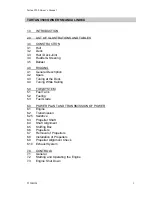
11
S
TORAGE
/ T
RANSPORT
STORING YOUR KAYAK
Boats made from polyethylene plastic are strong,
rigid and highly impact resistant, but due to
the nature of plastic in general, it is important
to store your boat properly. It is always best to
store your kayak indoors, out of direct sunlight
and protected from inclement weather.
Preferably, you should stand your boat on end
or hang it suspended by slings. Hanging your
boat from its grab loops or handles increases the
chance of warpage. You can also store your boat
on the floor, upside down.
TRANSPORTING YOUR KAYAK
Because of their light weight and shape, kayaks
are ideally suited for car topping. Your primary
concern in carrying your kayak is that it stays
securely tied to the vehicle. As with storage,
another concern should be potential distortion
of the hull.
Car-topping the kayak is best done with a quality
roof rack specifically designed for attaching
kayaks (Thule, Yakima). Foam blocks/cradles
attached to the rack are another option. The
boat should be tied to the vehicle as well as the
rack by its grab handles.
Over tightening bow and stern lines will increase
the likelihood of warpage as will leaving the boat
tied tightly in the sun for prolonged periods.
Use slings or webbing straps suspended from the ceiling or wall.
Use foam to pad the areas where the kayak comes into contact with the wall.
Foam cradle or pad
Carry a single kayak cockpit down
Carry two or more kayaks cockpit to
cockpit - use upright roof bars
Your boat can also be stored hull up on parallel bars with weight supported
evenly throughout.
important
:
It is recommended to always stop shortly after
the start of your trip to make sure all fittings and
connections are secure and that the kayak will not
shift during travel.
caution
:
Do not suspend your kayak by using the grab
loops at either end of the boat. This can cause the
hull to distort over time.
Bow and
stern lines
2010_DG_Owners_Manual.indd 11
4/26/10 9:32 AM


































